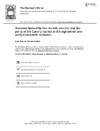Identificador persistente para citar o vincular este elemento:
https://accedacris.ulpgc.es/jspui/handle/10553/52480
| Título: | Diseases spread by sea: health services and the ports of the Canary Islands in the eighteenth and early nineteenth centuries | Autores/as: | Santana-Pérez, Juan Manuel | Clasificación UNESCO: | 550404 Historia moderna | Palabras clave: | Board of Health Canary Islands Epidemics Infection control Ports, et al. |
Fecha de publicación: | 2016 | Publicación seriada: | Mariner's Mirror | Resumen: | In the Canary Islands the sea was as a defence against disease. There was a constant fear of epidemics arriving by sea, not only because of the potentially high death toll, but because it could have a seriously detrimental effect on trade. As well as the local impact of disease, health control was important because the Canary Islands acted as an important buffer zone in the control of infection in the Spanish–American trade. Central and local administrations were created to manage health and to control the risk of disease entering the ports and to prevent epidemics from spreading to the interior of the islands. All arriving ships were inspected and any suspicious vessels were quarantined to contain any contagion. Specific quarantine areas were designated and these were developed with facilities such as infirmaries for the sick. Despite these measures the administrative control was weak and epidemics spread through the islands on a number of occasions throughout the eighteenth and nineteenth centuries. | URI: | https://accedacris.ulpgc.es/handle/10553/52480 | ISSN: | 0025-3359 | DOI: | 10.1080/00253359.2016.1202483 | Fuente: | Mariners Mirror [ISSN 0025-3359], v. 102 (3), p. 290-302 |
| Colección: | Artículos |
Citas SCOPUSTM
3
actualizado el 08-jun-2025
Citas de WEB OF SCIENCETM
Citations
3
actualizado el 22-feb-2026
Visitas
68
actualizado el 10-ene-2026
Descargas
175
actualizado el 10-ene-2026
Google ScholarTM
Verifica
Altmetric
Comparte
Exporta metadatos
Los elementos en ULPGC accedaCRIS están protegidos por derechos de autor con todos los derechos reservados, a menos que se indique lo contrario.
